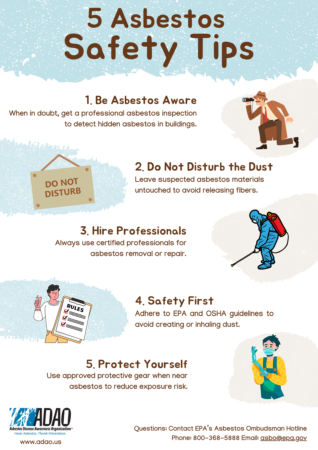Posted on April 24, 2024
As April’s Asbestos Awareness Month concludes, we reflect on an eventful start to 2024, brimming with new initiatives in the battle against asbestos. This year marks a critical turning point in our fight against asbestos exposure, and the work has only just begun! In response to the U.S. Senate’s unanimous approval of resolution S. 635, we’ve expanded National Asbestos Awareness Week to cover the entire month of April. Here’s an update on our efforts and the significant events of these past months.
The first quarter of 2024 has reinforced the ongoing public health threat posed by asbestos. Even after landmark EPA regulations, asbestos is not fully banned in the U.S., and significant work remains to end its importation and use. Prevention continues to be our strongest weapon against this hazard.
Annually, about 40,000 Americans succumb to asbestos-related diseases. While new uses have declined, legacy asbestos remains a serious threat in many older buildings across the nation. Education and heightened awareness are essential for preventing further illnesses.
The Importance of Education and Awareness
This April, we proudly introduced a new asbestos prevention flyer, a crucial tool offering practical tips for identifying and mitigating asbestos exposure risks. View and share our new prevention flyer here.
5 Essential Asbestos Safety Tips
- Be Asbestos Aware: When in doubt, get a professional asbestos inspection to detect hidden asbestos in buildings.
- Do Not Disturb the Dust: Leave suspected asbestos materials untouched to avoid releasing fibers.
- Hire Professionals: Always use certified professionals for asbestos removal or repair.
- Safety First: Adhere to EPA and OSHA guidelines to avoid creating or inhaling dust.
- Protect Yourself: Use approved protective gear near asbestos to reduce exposure risk.
Upcoming Free Webinar on Legacy Asbestos Prevention
Don’t miss our upcoming free webinar, “Legacy Asbestos Prevention: What is asbestos? Where is it found? What should I do? and Understanding Legislation and New Regulations,” on Tuesday, April 30 at 1:00 PM ET. Register here.
For further support and information, contact the EPA’s Asbestos Ombudsman Phone Hotline at 800-368-5888 or via Email: asbo@epa.gov. Additionally, we recommend the Environmental Information Association (EIA) as a valuable resource that offers access to certified professionals equipped to handle asbestos-related issues, including industrial hygienists and abatement services.
ADAO is dedicated to empowering individuals and communities by providing essential knowledge to effectively manage asbestos risks. We urge you to help spread this crucial information by sharing ADAO’s resources with your friends, family, and community. Together, we can make a significant impact on public health and safety, moving closer to a future free from asbestos-related risks.
Linda Reinstein

